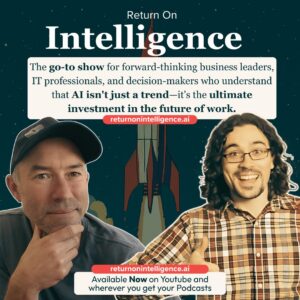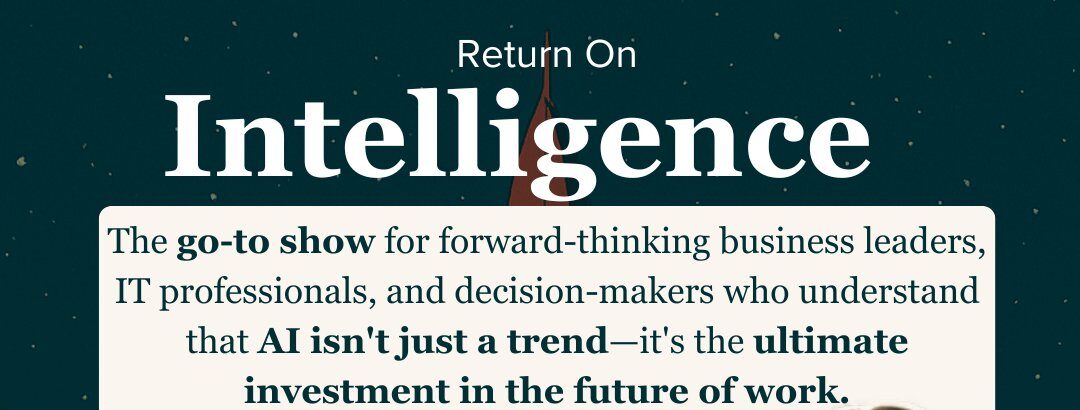The future of AI is being debated and decided right now. So when Daniel Anderson, a leading voice on SharePoint and Copilot, asked me a few weeks ago whether I’d consider starting a podcast (Return on Intelligence) with him, it was an easy decision. A podcast is directly aligned with why I write this blog. Why do I write? This is a question I’ve heard before, and the answer is simple:
To influence adoption of AI tools in ways that benefit people.
Developing and writing about AI isn’t just a hobby for me; it’s a mission. You can influence whether AI is helpful or harmful too! Will you join me?
Influence Adoption of AI Tools
I think when most folks hear the word, “productivity,” they immediately lose interest. Let me see if I can convince you that’s interesting.
My college degrees are in Computer Science and Management Information Systems, but I wanted to get a minor in Economics too. I’ve heard economics described as, “the science of making decisions.” That is much more interesting to me than chemistry!
There’s an economics principle that the level of productivity is “the most fundamental factor that determines the standard of living.“
An example of lighting
Take a look at this chart on the price of light over the last 300 years:

If we convert to from GBP in 2000 to USD in 2025, it would have cost $85,000 per year to use a single bright light bulb for 90 minutes a day in the 1300s. Most people just sat in the dark when the sun was down. Now I don’t even bother hassling my kids to turn off lights they aren’t using. An increase in labor productivity making candles, followed by invention of better lights, combined with improvements in infrastructure and distribution have provided essentially unlimited light for the entire developed world.
The same pattern applies to just about any area of modern life. Can it apply to AI as well?
AI and productivity
The United States historically grew productivity at 2.1%, and other western countries are similar. 1995-2005 grew particularly quickly with the rise of the personal computer and the internet. However, since 2006, productivity growth has been slower than this historical baseline. Mobile phones were not particularly helpful on this dimension. If we had standard growth over these 20 years, the economy would have literally trillions of dollars of more value and improved standard of living. I want to see this growth return.
I’ve been working in the latest software trends since 2011, starting with datacenters, then big data, then machine learning, and now generative AI. Some of these trends did make jobs a bit faster or cheaper, but only in small amounts. Unlike these incremental changes, Generative AI is set to have a dramatic impact on work. Multiple studies show that generative AI makes programmers 30% more effective. That’s a huge improvement! I expect the next studies with current models to increase this even more.
I think chatbots like ChatGPT have made individuals more productive and successful in their lives, but this is harder for economists to measure. The next feature that will show up in the data again is Deep Research. Features in this category including OpenAI Deep Research, Gemini Deep Research, and Researcher in Microsoft 365 Copilot have made another class of professionals sit up and take notice of major improvements to their jobs.
I believe that AI can do this for every type of knowledge work. I bet that economists will measure 30% productivity growth across all information work in the developed world by the end of 2026. We will see new charts of improved living standards just like the cost of lighting.
But not all productivity gains benefit people. How can we make sure that AI does?
In Ways That Benefit People
AI is going to make the economy more productive no matter what you or I do: the industry will keep shipping AI products. But what those AI products are remains to be determined. If you are involved in developing AI products, teaching people how to use AI, or encouraging adoption, you have a say in what those AI products will be. Will AI benefit everyone or only the shareholders?
Benefiting people
I work on Microsoft 365 Copilot because it is a personal assistant, purchased by people that directly get value from it. This is as opposed to search engines and social media where the customer is the advertiser. This aligns our product goals with the goals of people. If people aren’t getting a benefit, they won’t buy it. Some other AI products are free because they use your conversation data to train better models in the future, but we don’t operate that way. Copilot’s mission is to help people directly.
There are also AI products out there that pitch they can replace workers with AI. This is strictly bad for individual people in the short run. I’ll write more on this in a future article. Copilot’s mission is to benefit the individual, not replace them.
Democratizing access
Unlike every other technology in the history of the world, nearly everyone has access to generative AI chat. From Silicon Valley to the farms of India, anyone with a phone that wants to use AI can do so. Also for the first time in history, every person has access to the same level of technology. Elon Musk and Jeff Bezos use the same version of the AI that you do; money cannot buy them smarter computers.
On the other hand, using AI successfully is hard! It takes a lot of work to discover where it can help and where it’s useless. I hope that my writing and now my podcast help just a few of those billions of people become more productive with AI products.
Return on Intelligence Preview
Return on Intelligence is all about how to get real value out of the latest AI products. Instead of breathlessly repeating the latest feature releases, Daniel and I talk about how to apply them to your life and work.

Take our first episode: (Audio, YouTube, or search your podcast app). Daniel and I have an informal chat about the new Researcher and Analyst tools that have been coming out lately. I’ve also got some tips on how image generation opens new opportunities for using graphics at work. If you’re tired of the hype or wondering how AI can improve your life, this podcast is for you.






